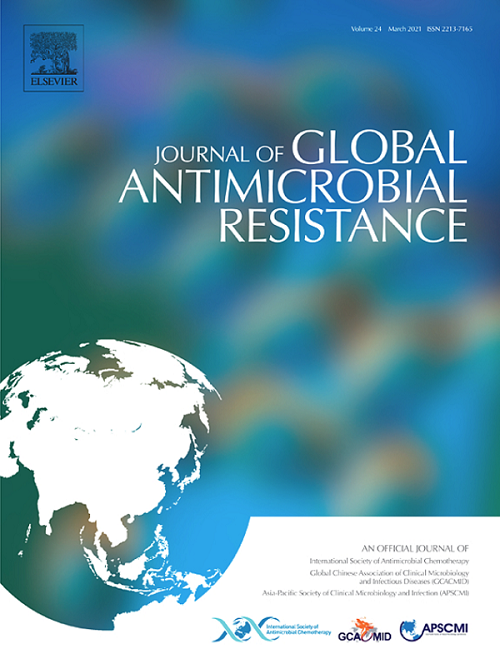日本某三级儿童医院耐碳青霉烯铜绿假单胞菌院内多克隆爆发的基因组解剖
IF 3.2
3区 医学
Q2 INFECTIOUS DISEASES
引用次数: 0
摘要
目的:耐碳青霉烯铜绿假单胞菌(Pseudomonas aeruginosa, CRPA)是一种重要的耐药病原菌。我们观察到日本一家三级儿童医院CRPA分离株的检出率有所增加。我们怀疑发生了一株克隆CRPA菌株的爆发,并进行了遗传研究,以阐明CRPA菌株的耐药机制和可能的传播。方法:对25株CRPA分离株进行8种铜绿假单胞菌常用抗生素的药敏试验。通过NGS分析对分离株进行全基因组测序,并进行比较谱系分析、AMR基因谱分析和传播途径的贝叶斯推断。结果:菌株的基因组不是单克隆的,而是由多个谱系组成,具有不同的序列类型。CRPA分离株具有功能失调的oprD基因,该基因是碳青霉烯类的输入源;然而,特定的核苷酸突变因谱系而异。此外,给予抗CRPA药物,如哌拉西林、头孢他啶和阿唑南,立即出现对这些药物的耐药性,在这些情况下,lasR中发现了一些独特的单核苷酸变异。结论:分子流行病学资料显示铜绿假单胞菌多系暴发,独立产生碳青霉烯类耐药性。这强调了铜绿假单胞菌对住院患者使用的抗菌素剂量的快速耐药性演变。本文章由计算机程序翻译,如有差异,请以英文原文为准。
Genomic dissection of nosocomial multiclonal-outbreak by carbapenem-resistant Pseudomonas aeruginosa strains in a tertiary children’s hospital in Japan
Objective
Carbapenem-resistant Pseudomonas aeruginosa (CRPA) is an important antimicrobial-resistant bacterial pathogen. We observed an increase in the detection rate of CRPA isolates at a tertiary children’s hospital in Japan. We suspected an outbreak of a clonal CRPA strain and conducted a genetic study to elucidate the resistance mechanism and possible spread of CRPA strains.
Methods
For 25 CRPA isolates, antimicrobial susceptibilities to eight antibiotics that are generally used for P. aeruginosa infection were tested. Whole genomes of the isolates were sequenced via next-generation sequencing analysis and subjected to comparative lineage analysis, AMR gene profiling, and Bayesian inference of transmission routes.
Results
The genomes of the strains were not monoclonal but comprised multiple lineages with various sequence types. The CRPA isolates had a dysfunctional oprD gene, which is an importer of carbapenem; however, specific nucleotide mutations varied by lineage. Furthermore, administration of antimicrobials against CRPA, such as piperacillin, ceftazidime, and aztreonam, was immediately followed by resistance to these antimicrobials, and in these cases, some unique single nucleotide variants in lasR were identified.
Conclusions
Molecular epidemiological data have revealed a multilineage outbreak of P. aeruginosa strains that independently developed carbapenem resistance. This emphasises the rapid evolution of antimicrobial resistance in P. aeruginosa in response to the antimicrobial doses administered to patients who are hospitalised.
求助全文
通过发布文献求助,成功后即可免费获取论文全文。
去求助
来源期刊

Journal of global antimicrobial resistance
INFECTIOUS DISEASES-PHARMACOLOGY & PHARMACY
CiteScore
8.70
自引率
2.20%
发文量
285
审稿时长
34 weeks
期刊介绍:
The Journal of Global Antimicrobial Resistance (JGAR) is a quarterly online journal run by an international Editorial Board that focuses on the global spread of antibiotic-resistant microbes.
JGAR is a dedicated journal for all professionals working in research, health care, the environment and animal infection control, aiming to track the resistance threat worldwide and provides a single voice devoted to antimicrobial resistance (AMR).
Featuring peer-reviewed and up to date research articles, reviews, short notes and hot topics JGAR covers the key topics related to antibacterial, antiviral, antifungal and antiparasitic resistance.
 求助内容:
求助内容: 应助结果提醒方式:
应助结果提醒方式:


